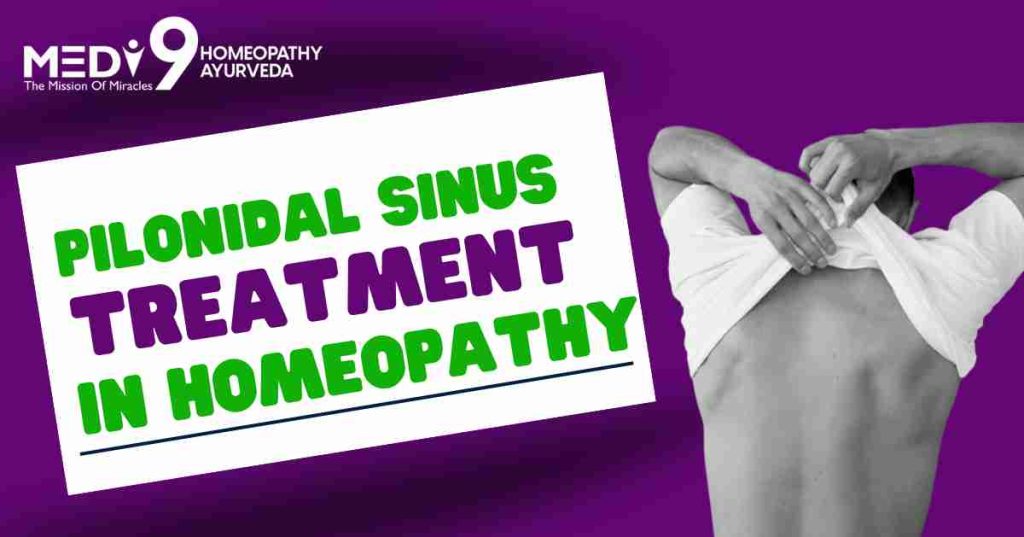What is a Pilonidal Sinus?
A pilonidal sinus is a small hole or tunnel in the skin, usually located near the tailbone at the top of the buttocks. It can become infected and filled with pus, forming a painful cyst or abscess. Pilonidal sinuses are more common in young men and can cause significant discomfort. Let us learn about pilonidal sinus treatment in homeopathy.
- Symptoms of Pilonidal Cysts
- Pain and swelling near the tailbone
- Redness and tenderness around the affected area
- Pus or blood draining from an opening in the skin
- Foul odor from the draining pus
- Fever (in case of infection)
How to Heal a Cyst?
Healing a cyst, particularly a pilonidal cyst, involves a combination of home care and medical treatment. Here are some general steps to promote healing:
- Keep the Area Clean: Maintain good hygiene to prevent infection.
- Warm Compresses: Apply warm compresses to reduce pain and swelling.
- Topical Treatments: Use antiseptic solutions or creams as recommended by a healthcare provider.
- Over-the-Counter Pain Relief: Take pain relief medications like ibuprofen or acetaminophen to manage discomfort.
Why Pilonidal Sinus Occurs?
The exact cause of pilonidal sinus is not clear, but several factors may contribute to its development:
- Ingrown hairs: Hair can become trapped in the skin, causing inflammation and infection.
- Prolonged sitting: Extended periods of sitting can increase pressure on the tailbone area.
- Hormonal changes: Hormonal changes during puberty may play a role.
- Friction and pressure: Tight clothing or activities that involve friction can contribute to the condition.
- Obesity: Excess body weight can add pressure to the tailbone area.
How to Get Rid of a Pilonidal Sinus Without Surgery
While surgery is a common treatment for pilonidal sinuses, there are non-surgical approaches that may help:
- Homeopathic Treatments: Various homeopathic remedies can be effective in managing symptoms and promoting healing (more on this below).
- Good Hygiene: Regularly clean the area and keep it dry.
- Hair Removal: Removing hair around the affected area can prevent hair from getting trapped.
- Antibiotics: In case of infection, antibiotics may be prescribed to reduce inflammation and infection.
Pilonidal Sinus Treatment in Homeopathy
Homeopathy offers several remedies for treating pilonidal sinus effectively:
- Silicea: Used for treating recurrent cysts and abscesses.
- Hepar Sulphuris: Effective for painful, inflamed cysts with pus.
- Myristica Sebifera: Known for its ability to hasten the maturation and drainage of abscesses.
- Calcarea Sulphurica: Helps in cases of persistent and stubborn cysts.
- Belladonna: Useful for acute inflammation with redness and throbbing pain.
Homeopathic treatments reduce inflammation, prevent recurrence, and promote overall healing.
Possible Causes of Pilonidal Sinus
- Genetic predisposition: Family history of pilonidal sinuses.
- Trauma: Injury to the tailbone area.
- Poor hygiene: Insufficient cleaning of the area.
- Excessive sweating: Sweat can irritate the skin and hair follicles.
- Obesity: Increases pressure on the tailbone area.
- Sedentary lifestyle: Prolonged sitting can exacerbate the condition.
[Also Read: Top 10 Best Homeopathic Medicine for Sinus Infection Treatment]
Pilonidal Sinus Treatment in Homeopathy Conclusion
Pilonidal sinus is a common yet painful condition that can significantly affect one’s quality of life. While surgery is a definitive treatment, non-surgical options, including homeopathic remedies, can be effective in managing symptoms and preventing recurrence. Maintaining good hygiene, reducing pressure on the tailbone, and considering homeopathic treatments can offer relief and promote healing.
Pilonidal Sinus Treatment in Homeopathy FAQs
Q. Which treatment is best for pilonidal sinuses?
A. The best treatment depends on the severity of the condition. Mild cases may respond well to homeopathic remedies and proper hygiene, while severe cases may require surgical intervention.
Q. Can Ayurveda cure pilonidal sinuses?
A. Ayurveda offers various treatments, including herbal remedies and lifestyle changes, which may help manage symptoms and prevent recurrence.
Q. How do you permanently remove pilonidal sinuses?
A. Surgical removal is often considered the most effective way to permanently remove pilonidal sinuses.
Q. How can I close my pilonidal sinus without surgery?
A. Maintaining good hygiene, using homeopathic treatments, removing hair, and following a healthy lifestyle can help close the sinus without surgery.
Q. Can pilonidal sinus be cured without surgery?
A. Yes, with proper management and treatment, pilonidal sinus can be managed without surgery, although severe cases may still require surgical intervention.
Q. Is pilonidal sinus dangerous?
A. While not typically life-threatening, pilonidal sinuses can cause significant pain and discomfort and may lead to complications if left untreated.

